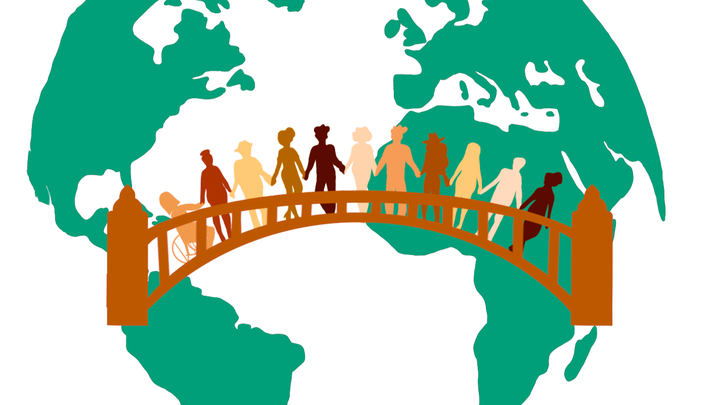
Support Bridging-Health Int'l to Reduce Period Poverty
Tax deductible
Want to join me in making a difference?
I am the founder of Bridging-Health Int'l (USA) and its affiliate non profit organization Ascending Health Foundation in Nigeria, West Africa. We are poised to improve health outcomes in line with the SDG agenda. We seek to provide health intervention to girls and the communities at large.
Any donation will help make an impact. We thank you in advance for your contribution to this cause.
$10,000.00 Donation Goal
Payments in Niara (Nigerian Currency) can be made to :
Project Details
UNFPA conducted a study in Nigeria, where they found that 57% of girls had poor knowledge about menstrual hygiene. Additionally, over 77% reported reusing non-reusable menstrual materials. There are also practices like using unhygienic materials like old clothes due to a lack of access to proper sanitary pads. (Unicef ,2015). Pooled prevalence of good menstrual hygiene practices among adolescent girls in a study of sub-Saharan Africa was 45% . Factors being living in Urban areas, affordability of menstrual sanitary products and having educated mothers. (Anbesu &, Asgedom,2023) as compared to rural dwellers.
Menstrual Hygiene Management
Gross inequalities and inequities summed with intense poverty is prevalent in rural communities in Africa. The lack of proper menstrual hygiene management (MHM) and lack of access to sanitary products continues to plague the health, education, and overall well-being of young girls in communities. The menstrual periods and or circle experienced by women/young girls demand hygiene. Sadly, some people reportedly use pieces of cloth during those times of the month; the cloth is washed and reused. In rural communities where access to drinking and cooking water is from the streams, the used pieces of clothes are also washed in the streams for reuse. The result is an increase in the spread of disease in an already struggling community with no health facility.
Health Implications
- Vaginal infections due to poor MHM can lead to serious health consequences, including reproductive and urinary tract infections.
- Lack of proper hygiene facilities and awareness puts girls at risk, making them vulnerable to health issues.
Education Disruption
In regions where girl education is already a challenge, the lack of access to sanitary pads can exacerbate the problem as noted below :
- Adolescent girls often miss school during their periods due to inadequate menstrual protection thus impacting negatively on their academic performance.
- Leakage caused by improper materials forces girls to stay home, interrupting their education and perpetuating gender disparities.
Social Justice and Empowerment
It is essential to recognize that MHM is not just a health issue but also a matter of social justice and gender equality.
- Providing sanitary pads in schools can significantly improve class attendance for girls.
- Initiatives that address menstrual hygiene not only promote health but also empower young women to continue their education without interruption.
Global Perspective
Worldwide, 2.3 billion girls and women lack proper menstrual hygiene management due to various factors like lack of facilities, high costs, and ignorance.
- Interventions should focus on improving access to sanitation facilities, raising hygiene awareness, and ensuring consistent attendance of girls in schools.
Solution
Bridging-Health Int’l with its affiliate Organization -Ascending Health Foundation (Nigeria) hopes to promote the health and wellness of young girls and women in Africa primarily the rural dwellers though :
- Provision of ecofriendly sanitary pads in schools and in the communities.
- Provide workshop/ campaign on hygiene and women health to promote safe and hygienic practices during menstruation.
- Provision of wash facilities with water in the school environment for safe hygiene.
Impact
- Improved health and wellness including improved academic performance.
- Alleviate mental health by bridging the inequalities and inequities between rural dwellers and city to mitigate rural urban migration.
- Improved hygiene with a reduction in diseases and outbreaks from washing used sanitary cloth/rags in the streams and or reusing sanitary towels as reported above.
Conclusion
In Nigeria and other low- and middle-income countries, addressing MHM is crucial for the health, dignity, and empowerment of young girls. The Sustainable Development Goal 10 (Reduced inequalities) and Goal 3 (Good Health and Wellbeing) are primary in improving health outcomes and bridging the huge disparity and inequalities of the rural community dwellers. Notably, addressing menstrual hygiene in Nigeria requires comprehensive efforts, including education, access to affordable products, and supportive policies. By promoting awareness and providing necessary resources, we can empower girls and women to manage their menstruation effectively and with dignity while reducing mortality and increasing class attendance of young girls. Support in this CAUSE will help us to impact on lives and improve health outcomes in rural communities of Nigeria.
Reference
Anbesu, E.W., Asgedom, D.K. (2023). Menstrual hygiene practice and associated factors
among adolescent girls in sub-Saharan Africa: a systematic review and meta-
analysis. BMC Public Health 23, 33 . Retrieved from
An assessment of menstrual hygiene management in secondary schools. Anambra, Katsina and Osun States, Nigeria. ( 2015). UNICEF Nigeria. Retrieved from
Donation Deadline Deadline : Not Specified
Project Website : https://bridging-healthintl.net/about-bridging-health-intl/
Project Location : Nigeria
Organizer
Bridging-Health Int'l
Beneficiary